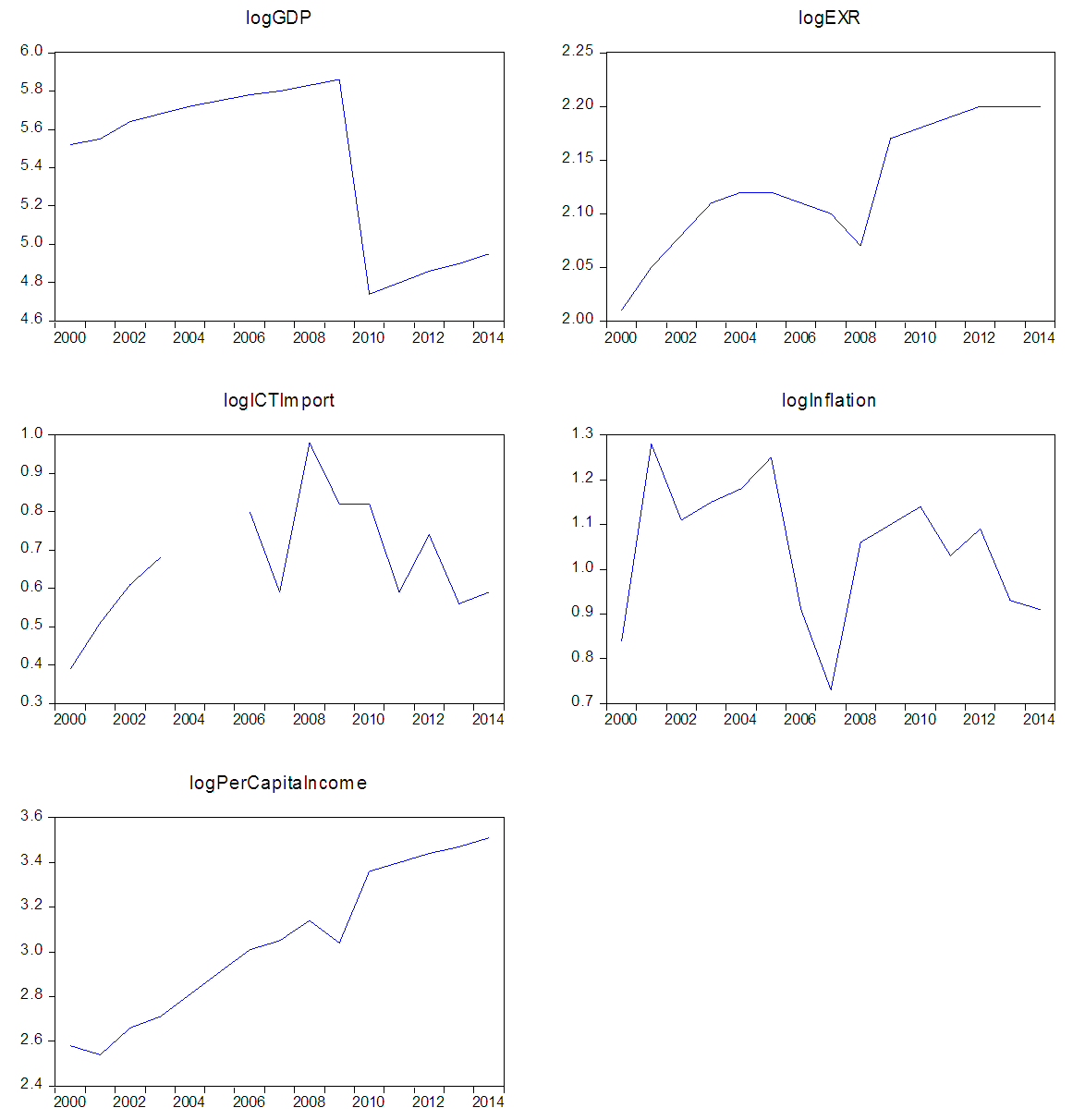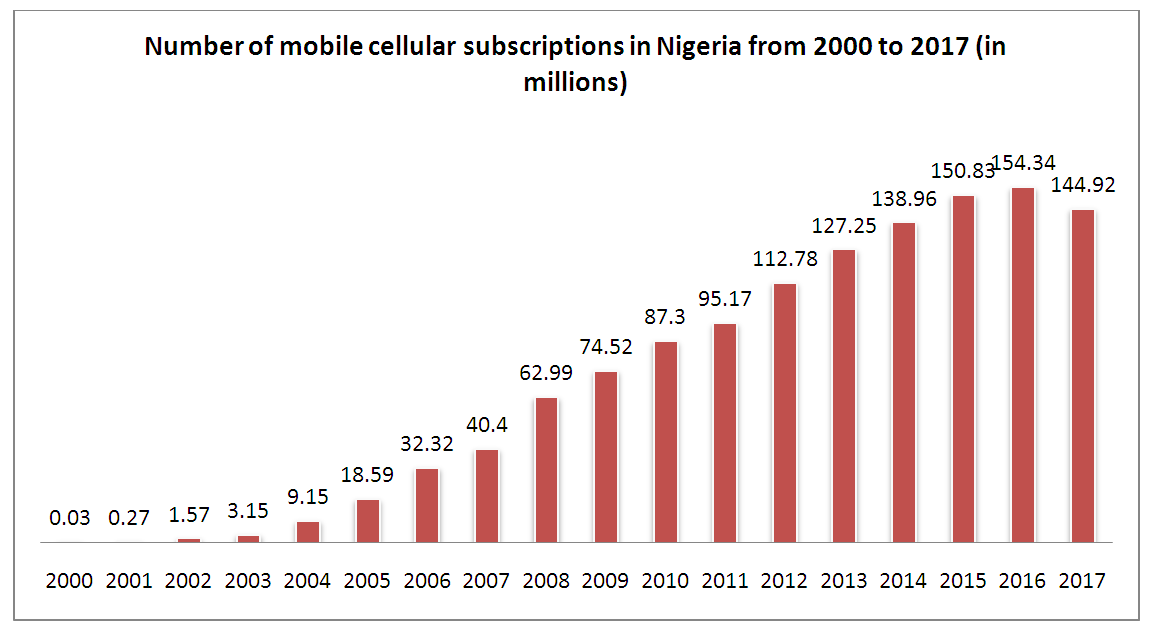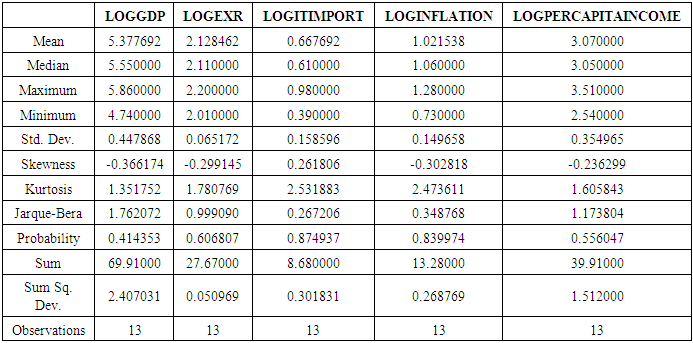-
Paper Information
- Paper Submission
-
Journal Information
- About This Journal
- Editorial Board
- Current Issue
- Archive
- Author Guidelines
- Contact Us
International Journal of Library Science
p-ISSN: 2168-488X e-ISSN: 2168-4901
2019; 8(2): 34-39
doi:10.5923/j.library.20190802.02

Information Technology as an Accelerator of Innovative Transformation of the Nigerian Economy
Oluwabunmi Ogunleye
Ekiti-State University Library, Ado-Ekiti, Nigeria
Correspondence to: Oluwabunmi Ogunleye, Ekiti-State University Library, Ado-Ekiti, Nigeria.
| Email: |  |
Copyright © 2019 The Author(s). Published by Scientific & Academic Publishing.
This work is licensed under the Creative Commons Attribution International License (CC BY).
http://creativecommons.org/licenses/by/4.0/

This paper is on Information technology as an accelerator of innovative transformation of the Nigerian economy. The study adopted a quantitative research design using secondary data gotten from Central Bank of Nigeria, Knoema and Statista from 2000-2014 and made use of SPSS software to perform data analysis while graphs were drawn using Microsoft Excel and Eviews 9.0. The findings of the study shows that IT import, inflation, exchange rate and Per Capita Income significantly jointly influenced the economy of Nigeria [(R2 = .866; F (4,12) = 12.931; p < .001)] which implies that IT import, inflation, exchange rate and Per Capita Income jointly accounted for about 86.6% of the variance observable in economy of Nigeria. In conclusion, information Technology positively impacts the economy of a nation and as such government of Nigeria at all levels should invest more in Information Technology so as to ensure a sustainable economic growth and development.
Keywords: Information Technology, Economy, ICT, Inflation, Exchange Rate
Cite this paper: Oluwabunmi Ogunleye, Information Technology as an Accelerator of Innovative Transformation of the Nigerian Economy, International Journal of Library Science, Vol. 8 No. 2, 2019, pp. 34-39. doi: 10.5923/j.library.20190802.02.
Article Outline
1. Introduction
- Information technology is any computer base tool that can be used for information processing needs of an organization such as libraries and information centers. (Hagg, cumming and McCubbery 2002). Information technology (IT) is a critical element for today's business. It supports corporate strategy and consumes a significant amount of a corporate’s resources. IT represents a significant investment for any corporation in today's business environment and the results can be disastrous if the IT investment does not support the organization in strategically outperforming its competitors. IT has intrinsic traits that can be utilized differently for different contingencies. For example one of IT traits, efficiency, is a critical component of the corporate's cost leadership strategy (Sethi and King, 1994). Thus a careful evaluation of relationships among application of IT, corporate strategy, and corporate performance is essential for organizational survival and growth.The Information Technology (IT) is the most transformative technology of our present generation and its development, even from the earliest days, has benefited from close partnership between government and various private sector companies which has continues to accelerate national development in Nigeria (Nwabueze and Ozioko, 2011). Development is partly determined by the ability to establish a synergetic interaction between technological innovations and human values (Iwu and Nzeako, 2012). Also national development implies a sustainable growth and development of a nation to a more desirable one (Adekoya and Kolade, 2012). National development is people oriented and its success is evaluated in terms of the impact it has had in improving the lot of the masses (Enyi, 2014). Information technology has created impact in Nigeria. It has various opportunities for job seekers in the area of web design, business centre, graphic design; data programming etc. Information and communication technologies (ICT) are electronic technologies used for information storage and retrieval. Development is partly determined by the ability to establish a synergistic interaction between technological innovation and human values (Esharenana & Emperor, 2010).The term creative economy first coined by Howkins (2001), has attracted worldwide attention. Creative economy may be defined as a policy that aims to generate new growth through economic operations that promote creativity, knowledge convergence, and advanced scientific technology based on coordinate learning, consequently creating a new market and new jobs. This may be inferred as representing a new paradigm in economic development that has evolved out of the chase-and imitate economic model followed by most developing countries until now (National Information Society Agency, 2013). According to Howkins (2001), creative economy comprises advertising, architecture, art, crafts, design, fashion, film, music, performing arts, publishing, R&D, software, toys and games, TV and radio, and video games. An examination into noticeable differences in the application of IT in creative and manufacturing industries promises to be valuable as the results may better elucidate the nature and characteristics of creative economy. The creative economy concept has emerged as a means of focusing attention on the role of creativity as a force in contemporary economic life, stating that economic and cultural development are not separate but can be a part of a larger process of development. The term ‘creativity’ gained traction in professional disciplines in the 20th century in educational theory and psychology, drawing on models of artistic practice and perception to suggest different forms of learning and understanding from those of ‘linear’ rationalist thinking. With the advent of the knowledge economy in the late 20th century, Richard Florida and John Howkins were placing these knowledge workers under the banner of the ‘creative class’ and ‘creative economy’ by the late 1990s (Oakley, 2009). At this time the notion of creativity became linked with innovation. The creative economy is also being linked to positive gains on the environmental front. From an environmental perspective, the creative sector is relatively low impact. Cultural activities are most often experience-based rather than material-based and require less infrastructure over other industries. With a more recent trend towards ethical consumerism, producers and consumers are questioning the true cultural, economic and environmental values of what they create, buy and sell. Pier Luigi Sacco takes this a step further by suggesting that “the arts and culture as an economic sector may contribute to a reorientation of economic development towards more sustainable perspectives”.Development is essential and critical to growth and sustenance of any country (United Nations Conference on Trade and Development, 2005). In order to successfully enhance meaningful national development in all area of the economy in Nigeria, effective strategies must be evolved. According to Terry Lucey (2005) Information and Communication Technology is acquisition, processing, storage and dissemination of vocal, pictorial, textural and numerical information by micro –electronics based combination of computing and telecommunications. There is a growing awareness that IT are not reaching to rural dwellers to enhance their socioeconomic and livelihood activities as well as the Nigeria aggregate national development (Bello and Aderbigbe, 2014). The main reason could be attributed to the poor linkages between research organization, and rural dwellers and poor technical know-how.ICTs include a heterogeneous series of products and services. The ICT sector itself includes semiconductors, voice telephony technologies, and technologies supporting high-speed data and audio-visual systems as well as computers and packaged and customised software. There is no single technological pathway that must be followed by countries that are seeking to enhance and extend their national infrastructures or to connect them to global information networks. Given their different starting points, the technical configurations and the service applications that are selected by the public and private sector actors in developing countries are likely to vary considerably. Their choices are influenced by past investment levels, existing hardware and software production capabilities, experience with the customisation of the new products and services, and the capital available to promote new ICT applications. Rapid innovations in IT applications and the availability of high-speed networks are creating opportunities for generating and managing increasing amounts of information that can be tailored to users’ needs and which can contribute to development goals. In order to benefit from these developments, however, a wide range of technological and related capabilities need to be strengthened (Bell and Pavitt, 1993).
1.1. Statement of the Problem
- Information Technology has the capacity to transform the economy of any nation as it allows acceleration transfer of knowledge both between generations, and between people of one generation. Likewise, the knowledge bases and interaction with Information Technology helps а person to adapt to requirements of modern society. The new information technologies are widely perceived as major tools for kick-starting ailing economies and consequently assist developing societies `catch up' with the developed world, including those groups that have lost out of the mainstream of development. (Levi, Inayatullah & Tony, 2013). Accordingly, information technology crises affecting the ranging levels of people's standard of living, poverty level has now gained the attention of economic observer's throughout the world. They have linked the problems of under employment and socio-economic crisis to information inadequacies. In this context, Information Technologies have been perceived as availability and accessibility of internet facilities, telecommunication equipment's and services media and broadcasting, libraries and documentation centres, commercial information providers, network-based information services and other related information activities (Odufowokan, 2010). Information technologies serve as new tools for escaping from poverty, empowering impoverished communities, and providing access to vital resources and information. The present study will therefore examine Information technology as an accelerator of innovative transformation of Nigerian economy.
1.2. Objectives of the Study
- The main objective of this study is to examine Information technology as a parameter accelerating innovative transformation of Nigerian economy. The secondary objectives are as follows:i. To examine the economic state of Nigeria.ii. To examine the impact of information technology in Nigeria.iii. To assess various ways information technology accelerates the innovation and development of Nigeria economy.
2. Literature Review
- Piatkowski (2004) analyzes eight transition economies in Central and Easter Europe highlights that ICT had a large contribution to GDP and labor productivity growth in CEE countries. This study shows that the new EU member countries have been successful in using ICTs to increase their income levels relative to the other EU member states. Spillover effects, which are more difficult to measure, have further helped theses countries to catch-up to its western neighbors. Jorgenson (2005), comparing the period 1989-1995 with 1995-2003, uses separate measures of ICT investment, non-ICT investment, and several measures of labor to determine the correlation between changes in ICT investment levels and GDP growth. According to the results of this study, the group that benefited the most from ICTs was the G7, where almost one third (27 percent) of the GDP growth that occurred from 1995-2003 was due to ICT investment. However, in major developing and transition countries (countries adopting a market orientation), ICT capital played a smaller (although increasing) role. Sub-Saharan Africa shows similar economic impact from ICT capital growth over time – about ten percent – while most other groups showed a greater impact in the later period. Latin America jumped considerably from the first time period to the second. Vu K. (2005) in his study that confirms ICTs have a significant impact on economic growth. The study, which analyzes 50 major ICT-spending countries, highlights that ICT contribution to economic growth is a global phenomenon, which is evident not only in developed economies but also in developing ones. However, key determinants why ICT contribution to growth varies include educational levels, institutional quality and openness. To estimate the contribution of ICT to economic growth and efficiency going beyond the growth accounting methodology, Thompson and Garbacz (2007) use a stochastic frontier production function approach to determine the impact of communication networks and economic reform on economies below the frontier. They find a positive contribution of information networks to economic growth. Gholami, Guo et al. (2007) use a broad definition of ICT, not separating ICT hardware, ICT software and telecommunication equipment but focus more on the differences of ICT and R&D spillovers between developed and developing countries. Guitat and Drine (2007) used estimates of the stock of ICT capital (hardware, software, and telecommunication equipment) to estimate the direct and indirect contributions of ICT on economic growth in 14 MENA (Middle East and North Africa) countries between 1992 and 2004. They concluded that there is a positive and significant direct impact of ICT on GDP (especially for oil producing countries).
3. Methodology
- This study adopted a quantitative research design using secondary data gotten from Central Bank of Nigeria, Knoema and Statista from 2000-2014. The study made use of SPSS software to perform data analysis while graphs were drawn using Microsoft Excel and Eviews 9.0. The descriptive statistics method was used to compute the mean, standard deviation, skewness, kurtosis etc while multiple regression analysis was used to compute the impact of Information technology as an accelerator of innovative transformation of the Nigerian economy. The dependent variable was GDP while the independent variables were IT import, inflation, exchange rate and Per Capita Income.
4. Data Analysis
- Table 1 shows that logGDP has the highest mean of 5.377 and standard deviation of 0.448, followed by logPer Capita Income with mean of 3.070 and standard deviation of 0.3550, logEXR has a mean value of 2.128 and standard deviation of 0.0652, logInflation has mean value of 1.0215 and standard deviation of 0.149 while logIT Import has a mean of 0.6677 and standard deviation of 0.1586. This shows that logGDP has the highest mean value followed by log Per Capita Income while log ICT Import has the lowest mean value.
|
|
|
|
 | Figure 1. Line charts of GDP, EXR, IT Import, Inflation and Per Capita Income |
 | Figure 2. Number of mobile cellular subscriptions in Nigeria from 2000 to 2017 (in millions) (Source: Statista) |
5. Conclusions
- The present study examines Information technology as an accelerator of innovative transformation of the Nigerian economy. The study shows that IT import, inflation, exchange rate and Per Capita Income significantly jointly influenced the economy of Nigeria [(R2 = .866; F (4,12) = 12.931; p < .001)] which implies that IT import, inflation, exchange rate and Per Capita Income jointly accounted for about 86.6% of the variance observable in economy of Nigeria. This finding agrees with Jorgenson (2005) who used separate measures of ICT investment, non-ICT investment, and several measures of labor to determine the correlation between changes in ICT investment levels and GDP growth. According to the results of this study, in major developing and transition countries (countries adopting a market orientation), ICT capital played a smaller (although increasing) role. Sub-Saharan Africa shows similar economic impact from ICT capital growth over time – about ten percent – while most other groups showed a greater impact in the later period. Also, Vu K. (2005) in his study confirms ICTs has a significant impact on economic growth. The study, which analyzes 50 major ICT-spending countries, highlights that ICT contribution to economic growth is a global phenomenon, which is evident not only in developed economies but also in developing ones. This study therefore concludes that Information Technology positively impacts the economy of a nation and as such government of Nigeria.Therefore government should invest more on Information Technology in several areas of the economy such as the education sectors, recreation, civil service, business organisations, libraries in its kinds especially e-librarry and information centers so as to ensure information management system to promote quality information access and retrieval for sustainable economic growth and development.
 Abstract
Abstract Reference
Reference Full-Text PDF
Full-Text PDF Full-text HTML
Full-text HTML


